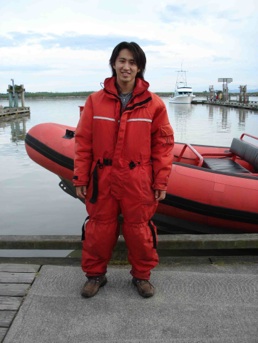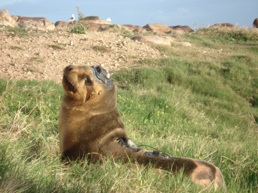Ippei Suzuki

Foraging Ecology in pinnipeds
Pinniped is the most abundant and diverse groups in marine mammals being distributed from the polar areas to the tropic areas. They are known as top predators in marine ecosystems, but their underwater behaviors have not been understood well. Knowledge of their foraging behaviors, where and when they forage, and information on their prey, what and how much they eat, are important information to maintain their lives with human activities. In my research, we are trying to quantify their foraging behavior and prey information using animal-borne devices.
Specifically, I am interested in their energetic balance while they are foraging at sea. Generally speaking, swimming is energetically expensive movement for terrestrial mammals, however, that is not the case for aquatic mammals as they have evolved their body to adapt to underwater lives. Although short-term comparison of animal locomotion; walking, running and swimming, has been investigated, details of their energetic strategy during long-term period, such as when animals go hunting, have not been known well. Understanding their energetic balance, how much energy they spend to catch prey, is a key to manage wildlife.



Publications and Presentations
Refereed publications
Suzuki I, Sato K, Fahlman A, Naito Y, Miyazaki N and Trites AW. (2014) Drag, but not buoyancy, affects swim speed in captive Steller sea lions. Biology Open 3: 379-386.
Suzuki I, Naito Y, Folkow LP, Miyazaki N, Blix AS. (2009). Validation of a device for accurate timing of feeding events in marine animals, Polar Biology 3: 667-671.
International Presentations
Suzuki I, Naito Y, Folkow L, Miyazaki N, Blix A. (2008). A new approach to detect underwater feeding events using mandible acceleration sensors in hooded seals, Cystophora cristata, The 3rd International Bio-Logging Science Symposium, Monterey, USA.
Suzuki I, Rodríguez D*, Davis RW, Ponce de León A, Sato K, Miyazaki N. (2010). Diving behavior and offshore activity budget during a foraging trip of a female South American sea lion (Otaria flavescens) off Isla de Lobos (Uruguay), The 4th South American Marine Mammal Meeting, Florianópolis, Brazil. Asterisk indicates a presenter.
Suzuki I, Blix AS, Trites AW, Naito Y and Miyazaki N. (2010). Understanding Energy Budget of Marine Mammals using Accelerometers, International Bio-logging Conference, Tokyo, Japan.
Suzuki I, Rodríguez D, Davis RW, Ponce de León A, Sato K, Miyazaki N. (2011). Diving behavior and offshore activity budget during a foraging trip of a female South American sea lion (Otaria fravescens) off Isla de Lobos (Uruguay), The 4th International Bio-Logging Science Symposium, Tasmania, Australia.

E-mail: : isuzuki@aori.u-tokyo.ac.jp